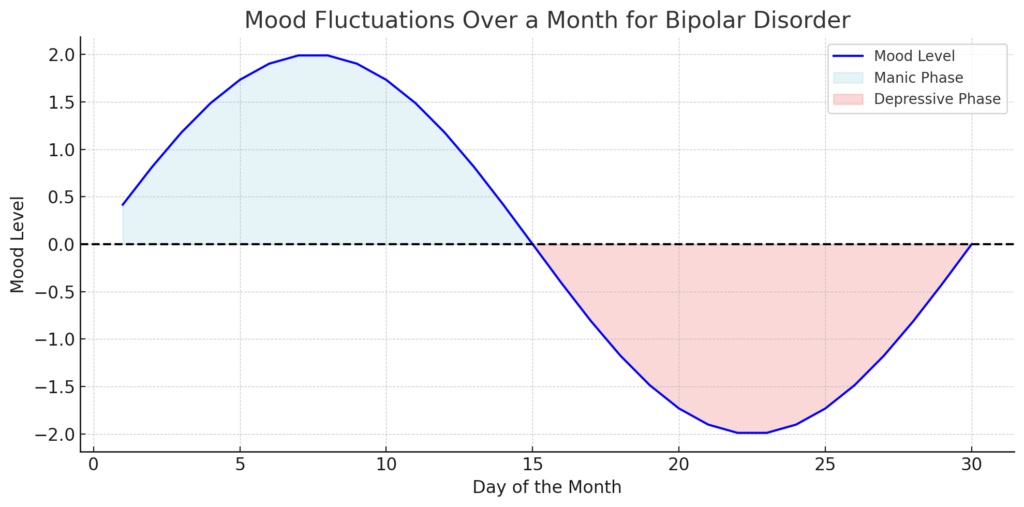Understanding the Mind: How a Person with Bipolar Thinks
Bipolar disorder is a complex mental health condition characterized by significant mood swings including manic highs and depressive lows, impacts millions of individuals globally. Understanding how a person with bipolar thinks requires delving into the nuanced interplay between neurobiology, environmental factors, and individual psychological processes.
Research in the field of psychiatry and neuroscience suggests that these mood fluctuations can significantly affect a person’s thoughts, behaviors, and decision-making processes. Studies have found alterations in brain structure and function in individuals with bipolar disorder, leading to unique cognitive and emotional patterns.
This blog aims to explore the inner workings of the bipolar mind, exploring the latest scientific insights and how they translate into the day-to-day experiences of those living with the condition.
What is Bipolar Disorder?
Bipolar disorder is a mental health condition marked by extreme mood swings that include emotional highs (mania or hypomania) and lows (depression). These mood swings can affect sleep, energy levels, behavior, judgment, and the ability to think clearly. Episodes of mood swings may occur rarely or multiple times a year. While most individuals will experience some emotional symptoms between episodes, some may not experience any.
Definition and Types
- Bipolar I Disorder: This type is characterized by manic episodes lasting at least 7 days or by manic symptoms that are so severe that immediate hospital care is needed. Depressive episodes occur as well, typically lasting at least 2 weeks.
- Bipolar II Disorder: Defined by a pattern of depressive episodes and hypomanic episodes, but not the full-blown manic episodes that are typical of Bipolar I Disorder.
- Cyclothymic Disorder (Cyclothymia): Periods of hypomanic symptoms as well as periods of depressive symptoms lasting for at least 2 years (1 year in children and adolescents); however, the symptoms do not meet the diagnostic requirements for a hypomanic episode and a depressive episode.
Symptoms of Bipolar Disorder
- Manic/Hypomanic Episode: Feelings of high energy, reduced need for sleep, loss of touch with reality, euphoria, and hyperactivity. Hypomania is similar to mania, but less severe.
- Depressive Episode: Feelings of sadness, emptiness, or hopelessness, significant loss of interest in most activities, significant weight loss or gain, insomnia or oversleeping, fatigue, and in severe cases, thoughts of death or suicide.
Understanding the varied symptoms and types of bipolar disorder is crucial for diagnosis and treatment, highlighting the importance of individualized care plans tailored to each person’s unique experience of the disorder.
Understanding the Bipolar Thought Process
The thought process of an individual with bipolar disorder can be profoundly affected by their current mood state. During manic phases, thoughts may race, leading to rapid speech and jumping from one idea to another, often with heightened creativity and grandiosity.
Conversely, during depressive phases, thinking can slow down significantly, making it difficult to concentrate or make decisions, often accompanied by negative thoughts about oneself, their life, and the future.
This cognitive shift can influence every aspect of life, from personal relationships to professional endeavors, making it challenging for individuals and those around them to keep up with these fluctuating thought patterns.
| Mood State | Thought Characteristics | Impact on Behavior |
| Manic | Rapid, jumping ideas, grandiosity | Impulsive decisions, increased activity |
| Depressive | Slow, difficulty concentrating, negative | Withdrawal, decreased activity |

How a Person with Bipolar Thinks?
Understanding how a person with bipolar disorder thinks involves recognizing the profound impact their mood state has on their cognition. During manic episodes, individuals may experience a flood of ideas, feel invincible, and have an inflated sense of self-esteem, leading to risk-taking behaviors and impulsive decision-making.
In contrast, during depressive episodes, their thinking can become clouded with self-doubt, pessimism, and a lack of motivation, making even simple tasks feel insurmountable. The cognitive shifts between these extremes can be bewildering, not only to the individuals themselves but also to those around them.
Manic Episode Thoughts:
- Overflow of Ideas: A person might feel like their mind is racing with thoughts and innovative ideas, often jumping from one concept to another.
- Feeling Invincible: There’s a heightened sense of confidence, sometimes leading to unrealistic beliefs about personal abilities.
- Impulsivity: This includes making quick decisions without considering the consequences, potentially leading to risky behaviors.
Depressive Episode Thoughts:
- Self-Doubt and Pessimism: Thoughts are often negative, focusing on personal failures, real or perceived, with a bleak outlook on the future.
- Lack of Motivation: There’s a significant drop in motivation to engage in activities once found enjoyable, leading to withdrawal from social situations.
- Overwhelming Feelings of Worthlessness: Intense feelings of guilt, worthlessness, and hopelessness dominate, making it hard to find self-compassion or value.
How Bipolar Disorder Affects Relationships
Bipolar disorder can have a profound impact on personal relationships, challenging partners, family members, and friends with its unpredictable mood swings. During manic episodes, the person with bipolar disorder may exhibit behaviors that are out of character, such as impulsivity, excessive spending, or inappropriate social interactions, which can strain relationships.
Conversely, during depressive episodes, they might withdraw from social contact, communicate less, and show little interest in activities they usually enjoy with others, potentially leaving loved ones feeling helpless or ignored. The cyclic nature of these episodes can create a rollercoaster of emotions for both the individual and those close to them, requiring a high level of understanding, patience, and communication.
Successful navigation of these challenges often involves open dialogue about the condition, setting boundaries, and seeking professional support to develop strategies for maintaining healthy and supportive relationships.
Supporting a Loved One with Bipolar Disorder
Supporting a loved one with bipolar disorder requires patience, understanding, and a proactive approach to care. It’s about being there for them through the highs and lows, offering support without judgment.
Recognizing the signs of both manic and depressive episodes can help in providing the right support at the right time. Encouragement to seek and continue treatment, maintaining a stable environment, and educating oneself about bipolar disorder are crucial steps in being a supportive partner, family member, or friend.
Here are some specific ways to support a loved one with bipolar disorder:
Educate Yourself: Learn about bipolar disorder to understand what your loved one is experiencing.
Listen Actively: Provide a supportive ear for your loved one to express their feelings and experiences.
Encourage Treatment: Support them in seeking professional help and adhering to their treatment plan.
Promote Healthy Habits: Encourage a routine that includes regular sleep, healthy eating, and exercise.
Establish a Crisis Plan: Work together to develop a plan for managing crises, including signs of severe mood changes and steps to take.
Offer Emotional Support: Show empathy and understanding, especially during mood swings, without judgment.
Maintain Patience: Remember that managing bipolar disorder is a continuous process, and showing patience is key to supporting your loved one’s journey to stability.
Why Do Bipolar Spouses Leave?
The challenges posed by bipolar disorder can sometimes strain a marriage to the point where a spouse may decide to leave. The decision to leave is often not a reflection of love or lack thereof but rather a culmination of the stress and difficulty in coping with the unpredictable and sometimes intense mood swings and behaviors associated with the disorder.
Manic episodes can lead to impulsive decisions, financial recklessness, or even infidelity, while depressive episodes can result in withdrawal, lack of communication, and a void of emotional intimacy. These dynamics can create a continuous cycle of stress, misunderstanding, and hurt for both partners. Additionally, if the partner with bipolar disorder is not consistently seeking or adhering to treatment, the situation can become increasingly untenable.
The decision to leave, in many cases, is driven by a need for self-preservation and the desire for a more stable and predictable life, especially if efforts to manage the disorder together have been unsuccessful. It underscores the importance of support, communication, and professional help in navigating the complexities of bipolar disorder within a relationship.
Living with a Bipolar Spouse: A Personal Journey
Living with a bipolar spouse is a journey that is both deeply challenging and profoundly enlightening. It’s a path marked by high peaks of joy and deep valleys of despair, reflecting the mood swings that characterize bipolar disorder.
This journey requires a reservoir of patience, empathy, and unconditional love, as well as an unwavering commitment to navigate the complexities of the condition together.
The experience of living with a bipolar spouse can be likened to being on a rollercoaster that you never chose to board, with unpredictable highs and lows that test the limits of your resilience and understanding.
The manic phases can bring excitement and creativity into your life, but they can also lead to impulsive decisions and reckless behaviors that strain your relationship. The depressive phases, on the other hand, may introduce a profound sense of helplessness as you watch your loved one struggle with feelings of worthlessness and despair, longing for the person they are outside of their episodes.
Key Insights from the Journey:
- Open and honest communication helps in managing expectations and understanding each other’s needs and limitations.
- Taking care of your own mental and emotional well-being is vital. It ensures that you have the strength and resilience to be there for your partner.
- Educating yourself about bipolar disorder and seeking support from therapy, support groups, or friends and family can provide valuable coping mechanisms.
- Cherishing the moments of stability and happiness helps to fortify the relationship and build a reservoir of positive memories to draw upon during challenging times.
- Supporting your spouse in adhering to their treatment plan, including medication, therapy, and lifestyle adjustments, is crucial for managing the disorder.
Living with a bipolar spouse is not just about managing the disorder; it’s about embracing the journey together, with all its challenges and triumphs. It teaches invaluable lessons about love, patience, and resilience, and about finding light in the darkest of times.
Through this journey, many couples find a deeper understanding and connection, learning to navigate the complexities of bipolar disorder as a team.
Conclusion
Understanding the mind of a person with bipolar disorder is crucial for fostering empathy, providing support, and navigating the complexities of relationships affected by this condition. This blog has explored the nuanced thought processes, challenges, and strategies for living with and supporting someone with bipolar disorder, aiming to illuminate the path towards more informed, compassionate, and resilient partnerships. Through education, communication, and commitment to treatment, it’s possible to manage the impacts of bipolar disorder and build a stronger, more understanding connection with loved ones.















